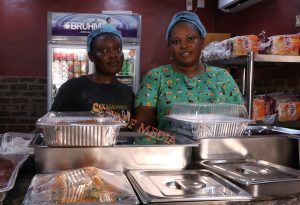By Babatunde Fajimi
Every young person that wants to become successful needs to understand the young adulthood phase of life where its horizon seems innocuous and learn to navigate its treacherous road of complexity and uncertainty.
The time of youth
The time of youth is the most engaging, entertaining and enterprising but ambivalent period for most young people. It is a time when the adolescent comes of age. A time of beauty, charm, glamour, energy and independence. A time to taste and enjoy life. A time to explore the world. Beyond the rollercoaster of this boisterous and carefree life, what prepares the young person for a great future transcends the pursuit of pleasure and leisure. It is a time of ground breaking for exploits. A time to dream and set a sail for the journey of a lifetime because youth can only be experienced once in a lifetime.
Young people are perplexed by this demand of young adulthood. They wonder why they cannot choose the Epicurean way without the unsolicited rites of passage that pull them towards Stoic discipline and the responsibility of early adulthood.
The young adult
There is no legal definition of who a young person is. The consensus among scholars suggests that the young adult is a person between the ages of 18 and 25. The Nigerian Child’s Right Act 2003 considered a person below the age of 18 as a child. The 1999 Constitution of the Federal Republic of Nigeria (as amended) recognizes that adulthood commences at 18. The UK Justice Committee classified young adults as persons between ages 18 and 25 years old.
Challenges of the young adult
The young people face the most challenging times of their lives in young adulthood. The experience is the similar whether the person is in Africa, Europe or America. Environment may be different, but the challenges are the same. Risking their lives to cross the desert or Mediterranean Sea into Europe to escape hardship in Africa increases the challenges.
The Central YMCA, a leading UK health, education and wellbeing charity organization, conducted a survey among young adult in 2016 to find out the challenges that young adults face in their society. The population sample included 1,600 young people between ages 15 and 25, 93 professionals working among young people through the charity organization and some thought leaders, experts, heads of NGOs and Members of Parliaments (MPs).
The survey identified 19 challenges. The top ten among them were lack of employment opportunities, failure to succeed in education system, problem of self-esteem, family problems, substance abuse, pressure of materialism (being able to afford the latest fashion or a new iPhone), lack of affordable housing, negative stereotyping, pressure of 24-hour social networking and crime. Others included financial exclusion, lack of things to do/leisure opportunities, increasingly sedentary lifestyle, online access to sites harmful to mental health and wellbeing, the policy of austerity, sexual health (the rise of sexually transmitted infections), lack of access to training (apprenticeships, internships, courses, learning and development), worsening environment and lack of political voice.
Erickson Amanda in a recent Washington Post analysis said that “the United States is … the only country where there are so many guns and where violence against students – children mostly – is almost routine”. The United States has a gun-violence epidemic and the most recent on January 23, 2018, involved a 15-year old killing two of his peers and injuring 18 others in Marshall County High School in Benton, western Kentucky. There have been more than 188 shootings at schools and universities, at least 200 injured and more than 200 students killed since 2000.
The Metropolitan Police chief, Cressida Dick told BBC Radio 4 Today programme that there had been a significant increase in knife crime and youth violence in London between April 2015 and 2017. The Metropolitan Police has taken thousands of knives off the streets working with the communities to create awareness and education about knife crime prevention from an early age because according to Commissioner Dick, “In London, we have a cohort of young people for whom violence has become a way of life.”
Young South Africans between the ages of 17 and 28 in a Vox Pops interview carried out by Kwazi Dlamini on March 29, 2018 in The Daily Vox listed identity crisis, inability to get finance to fund their studies, crime and drug abuse, unemployment and lack of opportunities for self-development as the struggles that face the young adults in South Africa
A 2012 report titled Young People in Sierra Leone Today: Challenges, Aspirations and Experiences by Restless Development, a youth-led development agency revealed that 63% of people aged 25-35 had never attended school in Sierra Leone. This report also stated that employers perceived people between 18 and 24 as being less reliable, less trustworthy, less hard-working, less cooperative and less skilled than adults. It said that more than 70% of young people in urban areas were unpaid workers.
In Sierra Leone according to Restless Development, 65% of young people aged 12-20 were sexually active. 68% of girls had their first pregnancy between the ages of 12-20. It quoted a UNICEF survey that 13% of teenage mothers had never been to school and 55% had dropped out of school and not returned since becoming pregnant. There were an estimated 34,000 unsafe abortions in Sierra Leone each year. Unsafe abortions accounted for about 8% of maternal deaths, the majority of which were endured by teenage girls and young women. 26.6% of women and 43.6% of men aged 15-24 had engaged in high-risk sexual intercourse in 2011 with a non-marital, non-cohabiting partner.
The plights of young adults in Nigeria is not different from its counterparts around the world. Young Nigerians have problems with illicit drugs, alcoholism, cultism, prostitution, rape, human trafficking, forced labour, aggression and gangsterism, early pregnancy and illegal abortion, poverty, disparity in education and employment, growing materialism and political violence. Most of them grapple with neglect arising from loveless or busy families, single parenthood, abusive homes and broken families. They are thrown into the harsh world of adults to fend for themselves.
Navigating youth into adulthood
The young adulthood’s independence should not result in rebellion against established authority and institutions given the numerous challenges that young people face in the society. It should awaken creativity and lead change. They should face these challenges with disruptive innovation to change their world.
Young people have been great inventors, scientists, innovators and agents of social transformation. If a young person’s rebellion leads to radical change of social order and enriches the culture of the world, young adulthood makes sense. Most people ruin their chances to make impact because they lack experience. The dreams and discipline of youth, hard work and tenacity will compensate for this inexperience to navigate these challenges as they prepare for productive adulthood by using these ten life-changing strategies.
- Seize the moment, believe in yourself. The young adulthood phase is a time to seize the moment and express oneself. The world is full of boundless possibilities but there are skeptics and cynics who are handy to recount how they have failed trying and why it cannot be done. Ignore skepticism and cynicism. They will always say it is impossible. Believe in yourself. Be bold. If you have a dream, go for and work at it. The best of inventions today like the light bulb, automobile, airplane, television and the personal computer were once dismissed as impossible. What stands between the young adults and their future is their faith in their dreams.
- Develop a sense of personal accountability. The young adulthood phase is a time of creative entertainment and enjoyment. Fun is not destructive if it is channeled in a productive direction. Young people should set boundaries. They should be mindful of the decisions they make and long-term consequences of their choices. This is the route of personal accountability that every young person should take.
- Be responsible for your action. Exploration requires risk-taking. The time of youth is the time to sow. Nature does not allow a vacuum. What a man sows, he is going to reap in due course. The tragedy of life is to sow the seed of misfortune and blame others when the harvest comes. The young adults must be ready to assume responsibility for their choices and action. This is the only phase of time that people make choices that shape their future. Prior to 18, others make decisions for children because they cannot legally do so. In middle and later adulthood, the environment may compel people to settle for options that they do not bargain for. If a future of purposefulness and usefulness must be guaranteed, the young adult must take responsibility for their actions at this phase of life.
- Moderation in pleasure. The pursuit of vanity can derail the young adults, particularly with the pressure of materialism and unrestricted boundaryless access to the social media. The young adults require utmost discipline to moderate their pursuit of pleasure. They deserve to be happy and explore their world. Youth comes once in a lifetime and should not be missed even in disabilities. Those who consciously curtails their use of happiness, entertainment, enjoyment, ecstasy, and euphoria in young adulthood become better adjusted and more useful to themselves in adulthood. This includes abstinence from harmful practices, drugs/alcohol abuse or other social vices that can alter the future of the young adults.
- Live for the future, enjoy the present. Anxiety may ruin the chances of adjustment for a young adult. They must live for the future by deliberately planning their lives and managing their time well. The way they use the present will determine what will happen in the future. Those who waste time in excess pleasure will wake up in the future and realize that they do not have the requisite skills to compete with their peers.
- Earn yourself respect and dignity. Abuse is rife despite the provisions of the relevant laws to protect young people in the land. The young adults have a responsibility to protect themselves. They should ensure that they do not allow anything to tamper with their sense of self-worth and dignity. It takes self-respect for the world to stand aside for the young adults. Without self-respect, they will struggle to make sense of the world around them. Self-respect induces humility and human dignity. Arrogance and pride have no place in the life of the young adults who respect themselves.
- Carve a space for yourself. Nothing happens in a vacuum in this world. The system does not yield any good thing to anybody unless they stand dignified and carve a space for themselves. The young adults owe themselves a duty to grow up and become their own persons.
- Get a skill, have a trade – acquire an exchange capacity. The future belongs to the young adults who have a value to offer in exchange for reward when they enter the world of work. Wealth responds to value creation. Riches acquired through get-rich-quick schemes and doubtful means are fleeting. It is only when young adults have marketable skills or profession that they can exchange for commensurate rewards that they are ready for the future.
- Make daily choices. Every day in the life of the young adults is an opportunity to define their future. They will have to make choices that are productive on daily basis. These become actions that buy the future of their dreams. Nobody gets to the future by flight. They arrive there by making every day counts. Invest in wholesome thoughts, imaginations and productive behaviours that sum up to create great daily choices.
- Start your journey in earnest. The journey into adulthood starts today. There is no room for procrastination. Any further delay or indulgence can ruin the chances of making the most of the time of youth.
Making the most of the time of youth
The future begins today. The journey into adulthood starts when the person becomes a young adult and nothing creative, productive and worthwhile should be spared to ensure that a solid foundation is laid for such a dream future.
Bibliography
A World of Good: The Challenges of Being Young in Modern Britain (2016). Central YMCA. Accessed and downloaded on March 29, 2018 from http://www.ymca.co.uk/campaigns/world-of-good
Child’s Right Act 2003
Constitution of the Federal Republic of Nigeria (1999) as amended
Erickson, A. (2018). The one number that shows America’s problem with school shootings is unique. Washington Post. Accessed and downloaded on March 31, 2018 from https://www.washingtonpost.com/news/worldviews/wp/2018/02/15/the-one-number-that-shows-americas-problem-with-school-shootings-is-unique/?utm_term=.fbd6c8ac6754
Judging Maturity: Exploring the role of maturity in sentencing of young adults. (2017). Howard League for Penal Reform. Accessed and downloaded on March 29, 2018 from https://www.t2a.org.uk/wp-content/uploads/2017/07/JudgingMaturity. HowardLeague.pd
Met Police Chief to visit Scotland for Ideas to reduce knife crime. (2018) The Guardian UK. Accessed and downloaded on March 29, 2018 from https://www.theguardian.com/uk-news/2018/feb/22/met-police-chief-cressida-dickto-visit-scotland-for-ideas-to-reduce-knife
What are young South Africans really facing today? The Daily Vox. Accessed and downloaded on March 29, 2018 from https://www.thedailyvox.co.za/challenges-young-south-africans-really-facing-today/
What Challenges Young People in Sierra Leone Today: Challenges, Aspirations, Experiences (2012). Restless Development Sierra Leone. Accessed and downloaded on March 29, 2018 from http://www.restlessdevelopment.org/file/state-youth-report-pdf
About the Author
Babatunde Fajimi is a trusted professional who has earned a reputation not only as a caring and hardworking entrepreneur but dependable consultant.
He is an alumnus of University of Ibadan, Lagos Business School, Cornell University Johnson Graduate School of Management and Galilee International Management Institute, Israel. He is an expert management consultant with a focus on business transformation, leadership, employee engagement and workplace performance. He is also a trained journalist with focus on development.
Over the last two decades, he has been involved with various organizations in the services sector across West and Central Africa at emerging and turnaround phases playing key roles in innovation and change management. Currently, he manages Kairos Business Services Limited and consults for start-ups, small businesses, large organizations and not-for-profit organizations helping them with start-up strategy, business development and design of policies, processes and procedures for productivity, profitability and business sustainability.
He is a Member of the Institute of Directors (IoDs), Chartered Institute of Personnel Management of Nigeria (CIPMN) and Nigeria Institute of Management (Chartered). He is a Licensed HR Practitioner (CIPM/HRPL/001025) and certified trainer. He is on the board of two non-profit organizations in Nigeria. He is also a Special Member of the Bible Society of Nigeria. He writes in The Punch newspaper on entrepreneurship and small businesses. At leisure, he loves cooking, walks for fun and collects antique out-of-print classics.





















